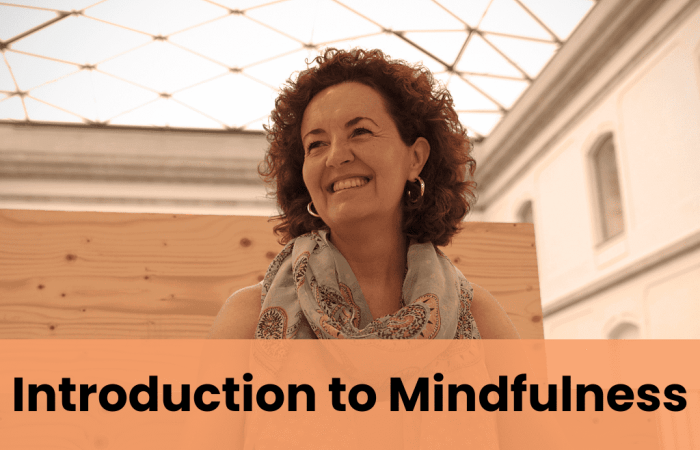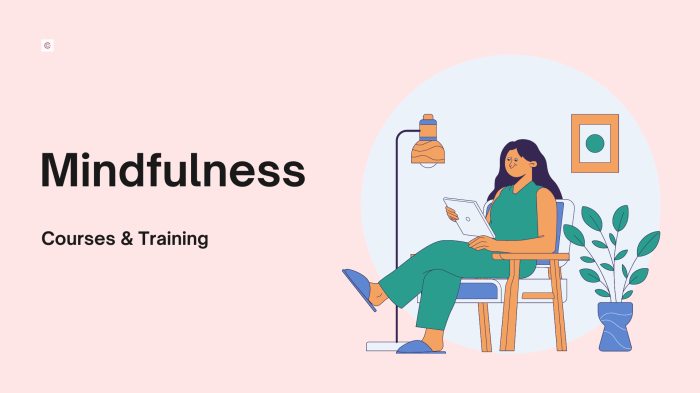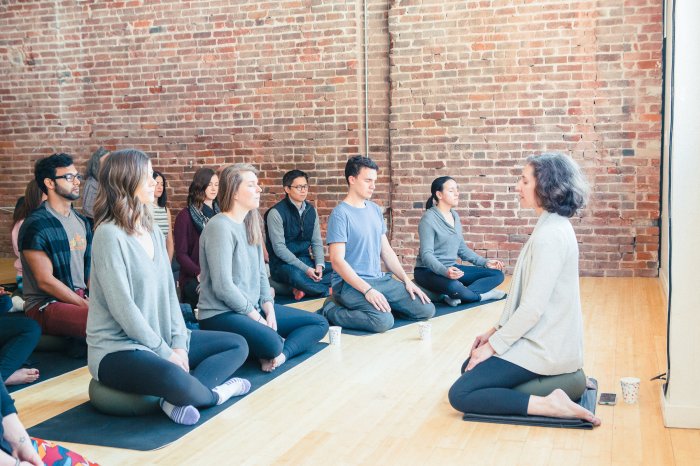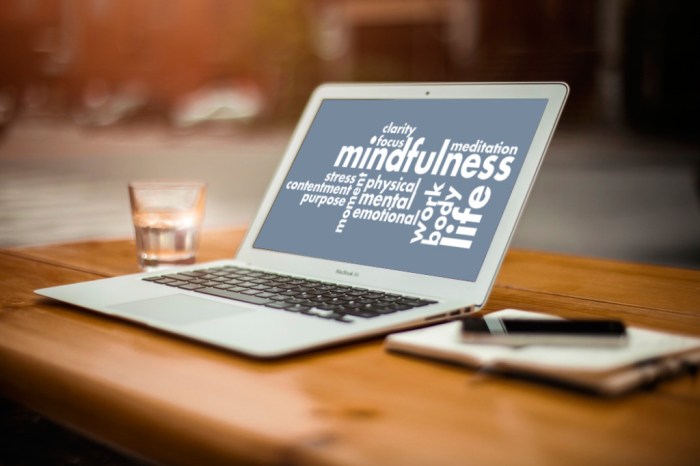Mindfulness Courses Online: Your Path to Inner Peace

Mindfulness courses online offer a transformative journey towards inner peace and well-being. These courses provide a structured approach to cultivating mindfulness, a practice that involves paying attention to the present moment without judgment. Whether you’re seeking stress reduction, improved focus, or greater emotional regulation, mindfulness courses online can guide you on a path to self-discovery and personal growth.
From guided meditations to mindfulness-based stress reduction (MBSR) programs, a variety of online courses cater to different needs and preferences. These courses often incorporate interactive exercises, guided audio sessions, and supportive online communities to enhance the learning experience. With the flexibility of online learning, you can access these transformative practices at your own pace and convenience.
Introduction to Mindfulness
Mindfulness is a practice that has gained significant popularity in recent years, and for good reason. It offers a powerful way to navigate the challenges of modern life and cultivate a greater sense of well-being. At its core, mindfulness is about paying attention to the present moment without judgment.
It’s about being fully aware of your thoughts, feelings, and sensations as they arise, without getting caught up in them. This simple yet profound practice can have a transformative impact on your life.
The Core Principles of Mindfulness
Mindfulness is grounded in a few key principles that guide its practice and application. These principles are interconnected and work together to cultivate a state of present-moment awareness.
- Non-Judgment: Mindfulness encourages observing thoughts and feelings without labeling them as good or bad. It’s about accepting whatever arises in your mind and body without resistance.
- Acceptance: Mindfulness involves acknowledging and accepting your experiences as they are, without trying to change them. This doesn’t mean you have to agree with everything you experience, but it does mean letting go of the struggle against reality.
- Present Moment Awareness: The foundation of mindfulness is focusing your attention on the present moment. This means letting go of worries about the past and anxieties about the future and simply being present in the now.
The Benefits of Mindfulness
Mindfulness has been extensively researched and its benefits are well-documented. By cultivating present-moment awareness, mindfulness can lead to numerous positive changes in your life.
- Stress Reduction: Mindfulness has been shown to effectively reduce stress levels. When you practice mindfulness, you become more aware of your stress responses and learn to manage them more effectively. Studies have demonstrated that mindfulness-based interventions can significantly reduce stress hormones like cortisol.
- Improved Focus and Concentration: Mindfulness helps to train your attention, making it easier to focus on the task at hand. This can be particularly helpful in today’s fast-paced world where distractions are constant. Research suggests that mindfulness practices can enhance cognitive function and improve working memory.
- Emotional Regulation: Mindfulness allows you to observe your emotions without getting swept away by them. By becoming more aware of your emotional patterns, you can develop greater emotional regulation skills. This can lead to a more balanced and resilient emotional state.
- Enhanced Self-Awareness: Mindfulness encourages self-reflection and introspection, leading to a deeper understanding of yourself. You become more aware of your thoughts, feelings, and motivations, which can help you make more conscious choices in your life.
Real-Life Examples of Mindfulness
The benefits of mindfulness are not just theoretical. Countless individuals have experienced positive transformations in their lives through the practice of mindfulness.
“I used to be constantly stressed and anxious, but since I started practicing mindfulness, I’ve noticed a significant shift in my overall well-being. I’m more able to manage my stress and I feel more grounded and present in my daily life.”
Sarah, a mindfulness practitioner.
“Mindfulness has helped me to be more present with my children. I’m more aware of their needs and emotions, and I’m able to respond to them with more patience and compassion.”
John, a parent who practices mindfulness.
“Mindfulness has been a game-changer for my career. I’m more focused and productive, and I’m able to handle difficult situations with greater composure.”
Emily, a professional who incorporates mindfulness into her daily routine.
Types of Mindfulness Courses Online

The online world offers a diverse range of mindfulness courses catering to various needs and preferences. These courses provide accessible and convenient ways to learn and practice mindfulness techniques, empowering individuals to cultivate greater awareness, manage stress, and enhance well-being.
Guided Meditation Courses
Guided meditation courses are designed to lead participants through structured meditation practices. These courses typically involve audio recordings or videos of experienced meditation instructors guiding participants through various techniques, such as breath awareness, body scan meditation, and loving-kindness meditation.
- Benefits: Guided meditation courses provide a structured and supportive environment for beginners to learn and practice meditation. They offer clear instructions, and calming voice guidance, and often include additional resources like journaling prompts or relaxation exercises.
- Examples: Popular online platforms like Headspace, Calm, and Insight Timer offer a wide selection of guided meditation courses for different purposes, including stress reduction, sleep improvement, and emotional regulation.
Mindfulness-Based Stress Reduction (MBSR) Courses
MBSR courses are structured programs based on the teachings of Jon Kabat-Zinn. These courses typically involve weekly group sessions and home practice, combining mindfulness meditation with gentle yoga, body awareness exercises, and discussions on stress management.
- Benefits: MBSR courses are renowned for their effectiveness in reducing stress, anxiety, and depression. They provide a comprehensive approach to mindfulness, integrating meditation with other practices to promote overall well-being.
- Examples: The University of Massachusetts Medical School offers online MBSR courses through its Center for Mindfulness. Several other organizations, such as the Mindfulness Association, also provide online MBSR programs.
Mindfulness for Specific Purposes
Many online mindfulness courses are tailored to address specific areas of life, such as sleep, relationships, and work performance.
- Benefits: These specialized courses offer targeted techniques and strategies to enhance mindfulness in specific contexts, promoting greater well-being and improved performance.
- Examples: Courses on mindfulness for sleep may focus on techniques to reduce racing thoughts and promote relaxation before bed. Mindfulness for relationships may address communication skills and emotional regulation in intimate connections. Mindfulness for work may explore strategies to enhance focus, manage distractions, and reduce stress in the workplace.
Popular Online Mindfulness Platforms
Numerous online platforms offer a wide array of mindfulness courses, providing accessible and convenient options for learning and practicing mindfulness.
| Platform | Course Names | Price Range |
|---|---|---|
| Headspace | Mindfulness Basics, Sleep, Anxiety Relief | $12.99/month or $99.99/year |
| Calm | Daily Calm, Sleep Stories, Stress & Anxiety | $14.99/month or $69.99/year |
| Insight Timer | Free guided meditations, paid courses, and retreats | Free with premium options available |
| Mindful | Mindfulness for Beginners, Stress Management, Relationships | $19.99/month or $199.99/year |
| The Mindfulness Association | MBSR Online Course, Mindfulness for Wellbeing | Varies depending on the course |
Choosing the Right Online Mindfulness Course

Embarking on a mindfulness journey can be enriching, but selecting the right online course is crucial for a successful experience. This section will guide you through the key factors to consider when choosing an online mindfulness course.
Factors to Consider
Choosing the right online mindfulness course requires careful consideration of several factors. These factors can help you narrow down your options and find a course that aligns with your needs and preferences.
- Experience Level: Consider your prior experience with mindfulness practices. If you’re a beginner, opt for a course designed for newcomers, often featuring foundational teachings and guided meditations. Experienced practitioners may benefit from courses focusing on advanced techniques or specific mindfulness applications.
- Course Duration: The duration of the course should align with your time commitment and learning pace. Shorter courses, typically lasting a few weeks, are ideal for introductory exploration. Longer courses, spanning several months, provide in-depth exploration and deeper practice.
- Course Format: Online mindfulness courses come in various formats, including live sessions, pre-recorded videos, interactive modules, and downloadable materials. Choose a format that suits your learning style and preferences. For instance, live sessions offer real-time interaction and guidance, while pre-recorded videos allow flexibility and self-paced learning.
- Instructor Qualifications: The instructor’s credentials and experience are essential. Look for instructors with expertise in mindfulness, meditation, or related fields. Check their qualifications, such as certifications, training, and professional affiliations.
- Course Content: Review the course syllabus or description to understand the topics covered. Ensure the course aligns with your interests and goals. For example, some courses focus on stress reduction, while others delve into specific mindfulness techniques like loving-kindness meditation.
- Price: Mindfulness courses vary in price, so set a budget before you begin your search. Consider the value offered, including the duration, content, and instructor qualifications.
Checklist for Choosing a Course
To make an informed decision, use the following checklist to assess your needs and preferences:
- What are your goals for practicing mindfulness? (e.g., stress reduction, improved focus, emotional regulation)
- What is your experience level with mindfulness? (e.g., beginner, intermediate, advanced)
- How much time can you commit to the course? (e.g., a few hours a week, a few days a week)
- What learning format do you prefer? (e.g., live sessions, pre-recorded videos, interactive modules)
- What are your budget constraints?
Tips for Finding Reputable Courses
- Seek Recommendations: Ask friends, family, or colleagues for recommendations. Online communities and forums dedicated to mindfulness can also provide valuable insights.
- Read Reviews: Explore reviews from previous participants on platforms like Coursera, Udemy, or other online learning marketplaces. These reviews can offer valuable insights into the course content, instructor, and overall experience.
- Check Credentials: Verify the instructor’s qualifications, such as certifications, training, or professional affiliations. Reputable instructors will typically have a strong background in mindfulness or related fields.
- Look for Accreditation: Consider courses offered by reputable organizations or institutions, such as universities, mindfulness centers, or professional associations. Accreditation can indicate quality and adherence to established standards.
The Online Mindfulness Experience

Embarking on a mindfulness journey online offers a unique and accessible approach to cultivating this essential skill. Online courses provide a flexible and convenient way to learn and practice mindfulness, regardless of your location or schedule.
Structure and Format of Online Mindfulness Courses
Online mindfulness courses are designed to guide you through the principles and practices of mindfulness, typically incorporating a blend of live sessions, recorded content, and interactive exercises.
- Live Sessions: These interactive sessions provide a real-time learning experience, allowing you to connect with instructors and fellow participants. Live sessions often involve guided meditations, discussions, Q&A sessions, and opportunities for group sharing.
- Recorded Content: Many online courses include pre-recorded videos, audio files, and downloadable materials. This allows you to access information and practice at your own pace, revisiting content as needed.
- Interactive Exercises: To reinforce learning and encourage personal exploration, online courses often incorporate interactive exercises. These can range from journaling prompts and guided visualizations to mindful movement practices and self-reflection activities.
Advantages of Learning Mindfulness Online
Online mindfulness courses offer a range of advantages, making them a popular choice for individuals seeking to explore and cultivate mindfulness:
- Accessibility and Flexibility: Online courses provide a convenient and accessible way to learn mindfulness, eliminating geographical limitations and allowing you to study at your own pace and on your own schedule.
- Variety of Options: The online learning landscape offers a diverse range of mindfulness courses, catering to different interests, levels, and learning styles.
- Cost-Effectiveness: Online courses are often more affordable than traditional in-person programs, making mindfulness practice accessible to a wider audience.
- Supportive Community: Many online courses foster a sense of community, connecting you with other individuals who share your interest in mindfulness. This can provide valuable support, motivation, and shared experiences.
Disadvantages of Learning Mindfulness Online
While online mindfulness courses offer many benefits, it’s important to consider potential drawbacks:
- Lack of In-Person Interaction: The absence of in-person interaction can sometimes make it challenging to establish a strong connection with instructors and fellow participants.
- Potential for Distractions: The home environment can be filled with distractions, making it difficult to fully immerse yourself in mindfulness practice.
- Technology Dependence: Relying on technology can present challenges if you experience technical difficulties or lack access to reliable internet connectivity.
The Importance of Finding a Supportive Online Community
A supportive and engaging online community can play a crucial role in your mindfulness journey. Connecting with others who share your interest in mindfulness can provide:
- Motivation and Accountability: Sharing your experiences and goals with a community can provide motivation and accountability, encouraging you to stay committed to your mindfulness practice.
- Support and Encouragement: Fellow community members can offer support, encouragement, and understanding as you navigate the challenges and rewards of mindfulness.
- Shared Insights and Learning: Engaging in discussions and sharing experiences with others can deepen your understanding of mindfulness and provide valuable insights.
Integrating Mindfulness into Daily Life: Mindfulness Courses Online

Mindfulness is not just a practice to be engaged in during structured courses; it’s a skill that can be seamlessly woven into the fabric of your everyday life. By integrating mindfulness into your daily routines, you can cultivate a greater sense of presence, awareness, and peace, even amidst the hustle and bustle of modern living.
Mindful Breathing Techniques
Mindful breathing is a fundamental practice in mindfulness. It involves paying attention to the natural rhythm of your breath, without judgment or trying to control it. This simple technique can help you anchor your attention to the present moment, reducing stress and promoting relaxation.
- Box Breathing: This technique involves inhaling for a count of four, holding your breath for a count of four, exhaling for a count of four, and holding your breath again for a count of four. It’s a calming technique that can be practiced anywhere, anytime.
- Belly Breathing: Focus on expanding your belly as you inhale and contracting it as you exhale. This deep breathing technique helps to engage your diaphragm, promoting relaxation and reducing tension.
- Observing the Breath: Simply notice the sensations of your breath as it enters and leaves your nostrils. Observe the rise and fall of your chest or abdomen without trying to change it. This simple act of awareness can help you stay grounded in the present moment.
Body Scan Meditation, Mindfulness courses online
Body scan meditation is a guided practice that involves bringing your attention to different parts of your body, and noticing any sensations you experience. It can help you become more aware of your physical self, reduce tension, and promote relaxation.
- Start with your toes: Notice any sensations, such as warmth, tingling, or pressure.
- Gradually move your attention up your body: Scan your feet, ankles, calves, thighs, and so on, noticing any sensations you experience.
- Pay attention to your breath: As you scan your body, continue to notice the rise and fall of your breath.
- Repeat the process: You can do a full body scan or focus on specific areas that feel tense or uncomfortable.
Mindful Walking
Mindful walking is a simple yet powerful way to cultivate presence and awareness. It involves paying attention to the sensations of your body as you walk, noticing the movement of your feet, the feeling of the ground beneath you, and the sights and sounds around you.
- Choose a comfortable pace: Walk at a pace that allows you to focus on your body and surroundings.
- Focus on your steps: Notice the feeling of your feet as they touch the ground and lift off.
- Engage your senses: Pay attention to the sights, sounds, smells, and textures around you.
- Be present at the moment: Let go of any thoughts or worries that arise and simply focus on the experience of walking.
Apps and Tools for Mindfulness Practice
There are numerous apps and tools available to support your mindfulness practice outside of structured courses. These resources can provide guided meditations, calming soundscapes, and helpful reminders to engage in mindfulness throughout your day.
- Headspace: This app offers guided meditations for various purposes, such as stress reduction, sleep improvement, and focus enhancement. It’s known for its friendly and accessible approach to mindfulness.
- Calm: Calm provides a wide range of guided meditations, sleep stories, and relaxing music. It’s designed to help you manage stress, improve sleep, and enhance your overall well-being.
- Insight Timer: This app offers a vast library of free guided meditations from teachers around the world. It’s a great resource for exploring different styles and finding meditations that resonate with you.
Mindfulness in Different Aspects of Life
Mindfulness can be integrated into various aspects of your life, enhancing your experiences and fostering greater well-being.
Work
- Improve focus and productivity: By practicing mindfulness, you can train your mind to stay present and engaged in your work, reducing distractions and increasing productivity.
- Manage stress and burnout: Mindfulness can help you identify and respond to stress triggers in the workplace, preventing burnout and promoting a healthier work-life balance.
- Enhance communication: Mindfulness can help you listen more attentively to colleagues and clients, improving understanding and fostering stronger relationships.
Relationships
- Strengthen connections: Mindfulness can help you be more present and engaged in your relationships, fostering deeper connections and understanding.
- Improve communication: Mindfulness can help you listen more attentively to your loved ones, respond with compassion, and resolve conflicts more constructively.
- Reduce conflict: By practicing mindfulness, you can become more aware of your own emotions and reactions, reducing the likelihood of conflicts and promoting a more peaceful and harmonious environment.
Personal Growth
- Increase self-awareness: Mindfulness can help you become more aware of your thoughts, feelings, and behaviors, leading to greater self-understanding and personal growth.
- Develop emotional regulation: Mindfulness can help you manage your emotions more effectively, reducing reactivity and promoting a sense of calm and balance.
- Foster gratitude: Mindfulness can help you appreciate the good things in your life, cultivating a sense of gratitude and contentment.
Closure

Embarking on a mindfulness journey through online courses can be a rewarding experience. By incorporating mindfulness into your daily life, you can foster a sense of calm, clarity, and purpose. Whether you’re seeking to manage stress, improve your focus, or simply cultivate greater self-awareness, mindfulness courses online offer a valuable resource for personal transformation.
Comments are closed.